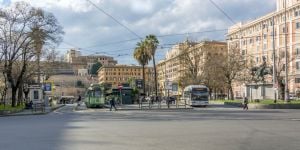
Italy has an efficient health system, but the level of care varies from one region to another. For example, the public health system, Servizio Sanitario Nazionale (SSN), is run at regional and provincial rather than national level, so the quality of treatment and services varies significantly. Here's what you need to know about healthcare in Italy and what you need to do if you're relocating there.
In general, many expatriates opt for private healthcare in Italy as they have health insurance either taken out before arriving or provided by their employer.
The National Health Service in Italy
The Servizio Sanitario Nazionale (SSN) is the national health service in Italy and generally provides good quality care. It provides free or low-cost care, including consultations with general practitioners, treatment, subsidized medicines, and specialized care. The SSN is funded by taxpayers and regional VAT and is managed at the regional and provincial levels. The structure to which you will refer is called Azienda Sanitaria Locale (ASL). The SSN services in northern Italy, including Lombardy, are among the best performing in the country.
Note that all expatriates holding a residence permit in Italy are entitled to the same treatment as Italian citizens. To do so, they must register with an ASL in their city of residence, presenting the following documents:
- A residence permit for citizens coming from countries outside the European Union;
- A valid identity document;
- The Codice Fiscale;
- A valid letter from their employer or an employment contract (or proof that you are self-employed);
- Residence permit (ask for a certificate of residence from the civil registry of the town hall);
- A household composition if you are married, unemployed, and dependent on your spouse.
Once registered, you will receive a health insurance card, the Tessera Sanitaria, which allows you to receive free healthcare in a public health facility and discounted prices for medicines prescribed by your general practitioner (medico di base).
The visit to the general practitioner is free of charge, and, if necessary, the latter will recommend a visit to a specialist or specific medication via a prescription, called ricetta bianca for care and medicines paid for by the patient (in part or in full) or ricetta rossa for care and medicines paid for by the national health system. In the Lombardy region, mainly diagnostic tests and medicines are covered.
Important:
If you have a fixed-term employment contract and are not yet a permanent resident in Italy, your Tessera Sanitaria and access to health care will only be active for the duration of the contract. Once you obtain a permanent contract, you will have to renew your access to health care every year until you obtain permanent residency (after 5 years of residence in Italy). To do this, you will have to go to the ASL of the city where you live each time and submit the documents already presented in your first request.
Good to know:
EU nationals can use their European Health Insurance Card (EHIC) to access public health services in Italy.
The health ticket system in Italy
The ticket or participation system, introduced in Italy in 1982, is how patients contribute to the cost of the public health services they receive.
Health services for which financial participation is required are the following:
- specialist visits and instrumental and laboratory diagnostic examinations;
- services provided in emergency rooms that are not emergencies (white codes) and which are not followed by hospitalization;
- spa treatments.
On the other hand, ticket payment is not foreseen for specific services and certain categories of patients, for example, public health benefits, vaccinations provided for in the national vaccination plan, benefits related to blood and organ donations, etc. Patients suffering from serious and chronic illnesses, pregnant women and disabled persons are also exempt from paying this health ticket. For a complete list, visit the Italian Ministry of Health website.
Private health care in Italy (Assicurazione sulla salute)
Private health care in Italy can be very expensive, with the Ministry of Health setting a minimum price for all private health care operations. It is, therefore, advisable to take out private insurance if you wish to use the private sector for healthcare in Italy and if your employer does not provide health insurance for its employees.
Despite the additional costs, there are many benefits to private healthcare in Italy, including the standard of care, the short waiting time, and the choice of facilities, technologies, and specialists available. However, it is advisable to avoid insurance companies that reserve the right to cancel your policy in the event of serious illness or when you reach a particular age, as it may be challenging to find alternative cover.
Health insurers such as Generali, Intesa San Paolo and UniSalute (Unipol Group) are popular with Italians. Do not hesitate to contact the insurer of your choice according to your needs. They will give you a precise quote based on your age, personal and professional situation, family life, etc.
The Italian private healthcare system, although very efficient, creates inequalities within the population. Those with a larger budget or private insurance can afford to pay full price for a visit and have an appointment almost immediately. On the other hand, some people may wait four to six months for an appointment made through the National Health Service.
However, there are now alternative solutions that try to bridge the gap between the two health systems. Indeed, many private clinics, sometimes called "smart clinics", are emerging and offer specialist appointments and laboratory tests at more affordable prices. These clinics are sometimes spurred on by large hospital groups, for example, the San Donato group in Lombardy. There are also groups such as Sant'Agostino, which has opened clinics mainly in northern Italy but also in Rome.
Good to know:
Check with your employer to see if he or she has health insurance and if private care is included in your coverage.
Prescriptions and medication in Italy
Under the SSN, medication prescribed by a general practitioner is provided at a subsidized rate or free of charge. For example, you will have to pay a 'co-payment' for prescription drugs such as antibiotics, insulin and hormone treatments.
Over-the-counter medicines such as paracetamol and ibuprofen are sold at full rate but are tax deductible (up to an amount equivalent to 19%) with the Tessera Sanitaria. Keep all your receipts from the pharmacy, and remember to present and scan your Tessera Sanitaria every time you buy medication.
Good to know:
If your doctor has given you an electronic prescription, the pharmacist will find it by simply scanning your tessera sanitaria. In addition, there are applications such as My Health Book, which your GP will offer you to download if they have an agreement with the platform. You can exchange emails and test results, and the doctor can also send you electronic prescriptions.
How to deal with an emergency in Italy
Dial 118 for emergency medical services in Italy, but keep in mind that the operators are not necessarily English or French-speaking. If you are not fluent enough in Italian to communicate in an emergency, call 112, a Europe-wide emergency number.
Emergency services can take as little as 8 minutes to arrive in cities and as long as 20 minutes in rural areas.
Finding a doctor in Italy
Finding an English-speaking doctor in your area can be problematic, so it is advisable to contact your local consulate. Some groups and communities have a permanent presence in Italy and provide information on daily life in Italy, including medical contacts. In short, finding a doctor in cities like Milan, Rome, Florence, Naples, Brescia, Bologna and Turin should not be a challenge.
If you are registered with the Italian health system, the Servizio sanitario nazionale, the local ASL with which you completed your registration, will provide you with a list of doctors in and around your neighborhood. You will then have to choose a health professional from this list. Note that some GPs may refuse to receive new patients if they already have a large patient database. You will then be offered an alternative, but always within a reasonable distance of your home. If the doctor you have chosen is not suitable for you, it is possible to request a change by contacting the relevant department of the ASL.
Emergency hospital care in Italy
Emergency rooms are open to everyone in Italy, whether or not the patient is affiliated with the public health insurance system. If you are able to do so, go to the pronto soccorso, which is the hospital emergency department. If you live in Milan, the San Raffaele Hospital, for example, has new structures and a recently renovated emergency department. Lombardy has created an application, Salutile, which allows you to visualize all the emergency services in the area, call them directly in case of need, and also to activate the patient's geolocation option.
Specialized care in Italy
The SSN also provides access to specialized medical care in public hospitals, but you will probably have to pay a small fee for examinations as only part of the amount will be covered by the Italian health system. You will need a prescription from a general practitioner (la ricetta) to access specialist services. This can be in paper or electronic format, and you will have to present it at the reception of the structure registered with the SSN at the time of payment of the services. This "ticket" allows you to pay only part of the medical costs.
As an alternative to public health services, you can schedule a visit to a specialist (with or without a GP prescription) through the private scheme. This is called regime di solvenza. You will pay the full price and will only be reimbursed for the service if you have private health insurance.
Healthcare for international students in Italy
According to international conventions ratified by European Union member States, health assistance recognizes international students in Italy. The latter can therefore benefit from the Italian health system depending on whether they come from Europe or a third country but under different conditions.
Healthcare for European students in Italy
Students from European countries will have access to the national public health service under the following conditions:
- if they have been officially resident in Italy for 5 years (ask for a certificate of residence at your town hall)
- if they are in possession of the S1 form (formerly E106) issued by the health insurance organization of the country of origin, which allows the health coverage to be active according to the duration defined in the form. The Europa.eu website provides a list of available forms for social protection within the European Union.
If free registration cannot be guaranteed, they can use a European Health Insurance Card (EHIC). Make sure you apply for it in your home country before leaving for Italy.
The Erasmus department of your university can also provide you with information if you have any questions on this matter.
Students from third countries in Italy
International students from third countries can voluntarily register with the Italian public health service for a flat fee of €150 for one academic year.
Alternatively, they can take out private health insurance, which will cover all the risks to which they are exposed for the period defined in the contract. Medical services cannot be paid for in advance but will be reimbursed on presentation of invoices and receipts for medicines.
The Italian Ministry of Public Health provides detailed information on the subject (in Italian), as does the European Union website, which informs you about your social protection rights in Europe and, more specifically, in Italy.
Useful links :
Directory of health structures in Italy
We do our best to provide accurate and up to date information. However, if you have noticed any inaccuracies in this article, please let us know in the comments section below.











